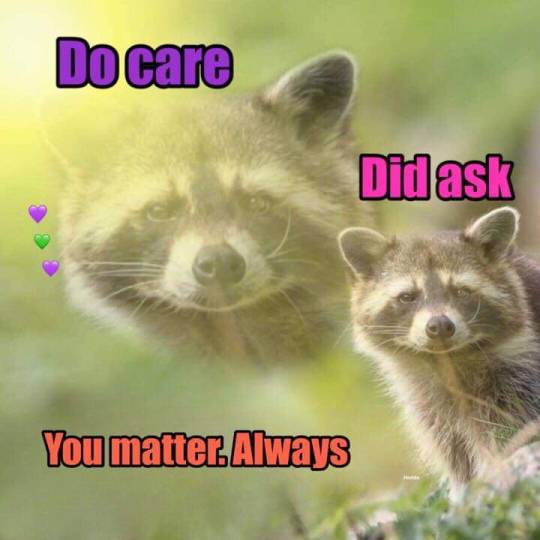#care work
Text
Btw, if you really just Need A Job (tm)
I'd really recommend looking into care work
Care work here is specifically being a home care aid, a care aid or assistant at any kind of residential home.
This for usually for elderly or disabled adults - and those are the ones that tend to be most entry level, from what I've seen, but also for mental health, addiction recovery etc. (With the obvious caveat that some of these jobs will be more emotionally intense than others)
I'm so serious about this guys. I was applying to jobs in care work for just three weeks, starting a couple days before Christmas, and in that time I got three interviews, two jobs offers, and five additional interview requests
Care work needs people CONSTANTLY
because it's a huge sector but very hard for them to keep staff long-term. Partly because it can be high burn-out, and there's definitely toxic places out there you should watch out for. And partly because a lot of people think care work is beneath them
AND they ACTUALLY MEAN IT when they say they're entry level. Because it's so hard for them to get staff that a lot of them will advertise super aggressively that they will train you themselves. A lot of them will straight up pay for your CPR and First Aid certifications, once they hire you, too (and you can get a leg up on applications by getting a CPR/First Aid certification for like. $30 to $80, at least in the US). They also accept experience taking care of elderly/disabled/etc. family members as real experience
Like, obviously don't do it if you hate taking care of people, but if you're open to it, it's probably by far your best shot of getting hired rn, statistically
(eta: Genuinely disclaimer that it can be super taxing emotionally and large portions of the industry are indeed fucked, and def don't take a job in this field if you're gonna be an asshole to the people you're caring for, but sometimes you just need whatever job you can get.)
Seriously, though, the first time I applied for a care work job (in October 2023, yes short timeline, like I said there's some toxic workplaces etc. out there), I applied to like ten or fifteen jobs over the course of a week or so. Within three weeks, I was working.
(And they did provide all of the training, fwiw)
If you need a job and no one is hiring, seriously consider looking into it
#not news#advice#adulting#jobs#job search#layoffs#me#care workers#care work#insert legal disclaimer about I can promise no results here lol but I wanted to share the tip#admittedly your chances are a lot higher if you're comfortable doing stuff like changing an adult's diaper#a thing which very many people get really unnecessarily snobby about#you don't have to be comfortable doing so yourself if you just aren't#that's fair enough considering some of the things involved#but don't be an ableist jerk about it to people who wear one#but yeah there are jobs where nothing like that is necessary so don't rule it out if you're not comfortable#job loss#jobsearch#unemployed#career advice#jobseekers#employment#fuck capitalism#cost of living crisis
543 notes
·
View notes
Text
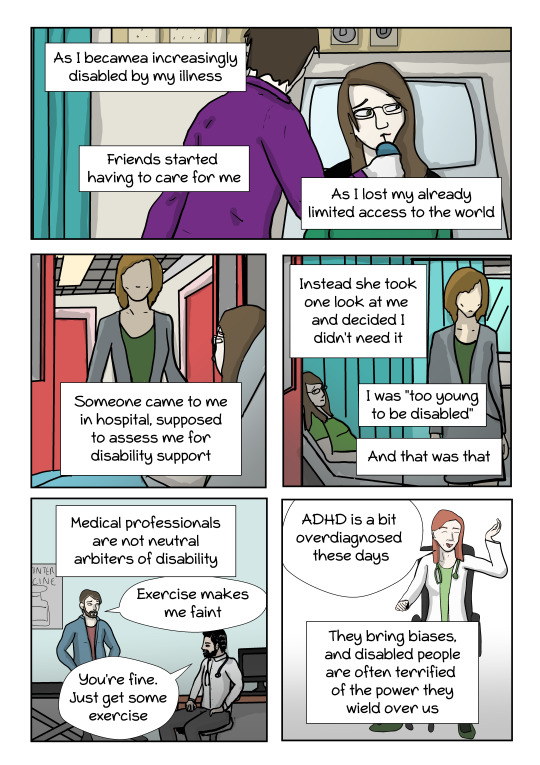

It's not that medical professionals are evil or something, it's that they're not equipped to judge the lives of disabled people because they largely have no experience comparable to it. They can't empathise because medical culture is fundamentally different than disabled lives, and in the cases of neurodivergent people, they largely can't empathise as neurotypicals with us. We need a culture of care/support that trusts disabled people/those we nominate to be the judge of our own needs
You can read more about the "triple empathy problem" for neurodivergent people in healthcare settings in this paper here: https://sussex.figshare.com/articles/journal_contribution/Barriers_to_healthcare_and_a_triple_empathy_problem_may_lead_to_adverse_outcomes_for_autistic_adults_a_qualitative_study/24424333
#disability#ableism#disableism#irish#ireland#disabled#politics#poverty#art#comic#comics#medical tw#medical bias#neurodivergent#medical trauma#care#care work#diagnosis#exercise tw#adhd#gaslighting#medical gaslighting#medical gatekeeping#cartoon gore#mental health#mental health crisis#hospital tw#academic papers#autistic#double empathy
79 notes
·
View notes
Text
Reproductive work is the basis of every human society, including capitalist society. Reproductive or care work is understood to mean all those activities that directly serve the maintenance and well-being of people, ranging from accompanying children and the elderly to cooking, housework, caring activities, and, in some definitions, gardening or repair work for personal needs, caring for nature, or subsistence farming. These activities comprise between 30 and 70 per cent of the economic output of a country, depending on the method of calculation. In a patriarchal economic system, reproductive work is in a permanent crisis because it is structurally devalued and poorly or not at all remunerated. This crisis is necessarily linked to the crisis-like development of the human–nature relationship. The permanent crisis of reproductive work can only be overcome by a different economic system that values, centres, and promotes care work. This is the prerequisite and goal of gender justice – and centring care has become a key cornerstone of degrowth.
The Future Is Degrowth: A Guide to a World Beyond Capitalism
101 notes
·
View notes
Text
you don’t have to necessarily agree with someone’s take to think their voice is important.
right now i’m seeing some discourse about the different access needs disabled ppl have, like physical access needs vs. sensory needs.
i don’t necessarily agree that late dx’d autistic folks are choosing to make their disability a big deal, i do think that our voices tend to take up more than our share of space i. the autism community. we tend to center our own experiences and not consider the overt isolation and dehumanization of growing up segregated because of a disability.
i will always support the most marginalized, and that includes the visibly, cognitively, and intellectually disabled.
#mad liberation#mad pride#autistic#disabled#psych survivor#disability#sanism#actually autistic#chronic illness#disability tag#cripplepunk#disability justice#intellectual disability#developmentally disabled#severe autism#level 2 autistic#level 3 autism#care work
64 notes
·
View notes
Text
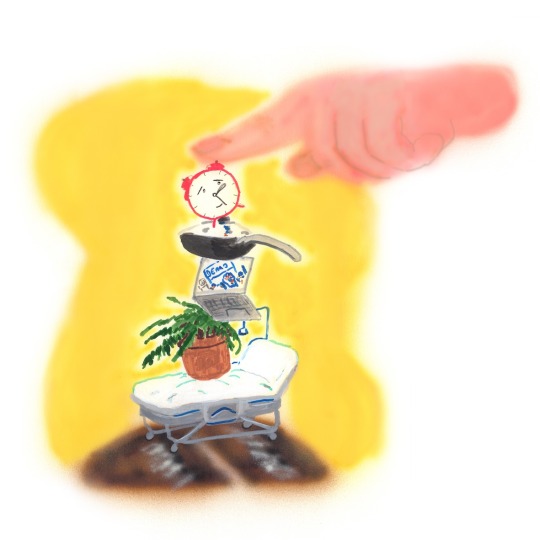

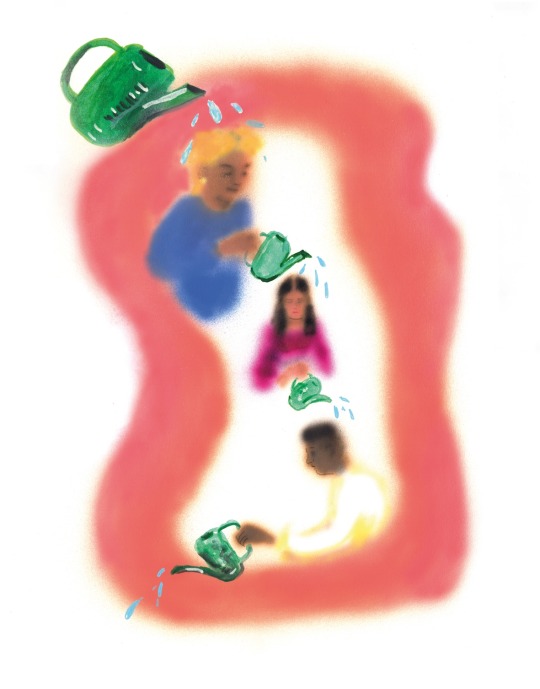
Illustrations for KUPF OÖ about "Care-Work"
Instagram
#care work#caring#illustration#airbrush#artists on tumblr#invisible work#illustrative art#illustrator
18 notes
·
View notes
Text

Care Work: Dreaming Disability Justice Culture by Leah Lakshmi Piepzna-Samarasinha (she/they) is an excellent essay collection about the goals and realities of collective care, access as radical solidarity and love, medical dismissal, and much more. Piepzna-Samarasinha imagines the possibilities of solidarity and reimagining care as a web of support rather than as care as cure.
As a chronically ill reader, Piepzna-Samarasinha's essays are illuminating and inspiring, and able-bodied people will benefit from considering disabled models of care and access, both because we all benefit from increased access, and because almost all of us will be temporarily or permanently disabled or ill at some point in our lives. Piepzna-Samarasinha writes about questioning the deficiency model of disability and disrupting the binary between healed and failed. She writes about the possibility of "doulas" who help welcome newly disabled people into the community and help them learn about a world they won't recognize or know enough about.
She talks openly about her experience as a survivor of assault and abuse and how in both that and in abuse, we need to consider that instead of picturing a future where we are cured, we have to picture futures where we are "unhealed" but thriving and successful. I really enjoyed her pieces on the expectations, struggle, suicidality, and emotional labor of femmes and how she hopes it can change. Overall, this is an excellent collection about being disabled, about the webs of care we can imagine and create, and about seeing the disabled community as one of possibility and creativity rather than condemnation or isolation.
Content warnings for police brutality, ableism, suicide/suicidal ideation, grief, abuse, sexual assault, trauma, medical dismissal.
#care work#leah lakshmi piepzna-samarasinha#disabled books#disability justice#health feminism#bias in medicine#my book reviews
42 notes
·
View notes
Text
at my old job as a care worker for adults with disabilities such as cerebral palsy, I worked for 11 months and dealt with situations such as epileptic seizures, life threatening infections and unidentified allergic reactions....
and THEN in month 8 I got my first aid training.
the sector is fucked, man
23 notes
·
View notes
Text
This is the face of a happy Gem...a Gem who is now on her way to hopefully gaining employment in the care sector.
Work & health meeting went well and with training and such i should be in work before july (thats the target theyve set me)






8 notes
·
View notes
Photo

Nydia Blas, Communion
#Nydia Blas#visual art: when Black artists create#color theory#light and such#texture: a feeling#beholding Black intimate geographies#the internal life of Black girls#care work#tenderness as a lingering touch#embodiment as grace#the Black bucolic aesthetic
227 notes
·
View notes
Text

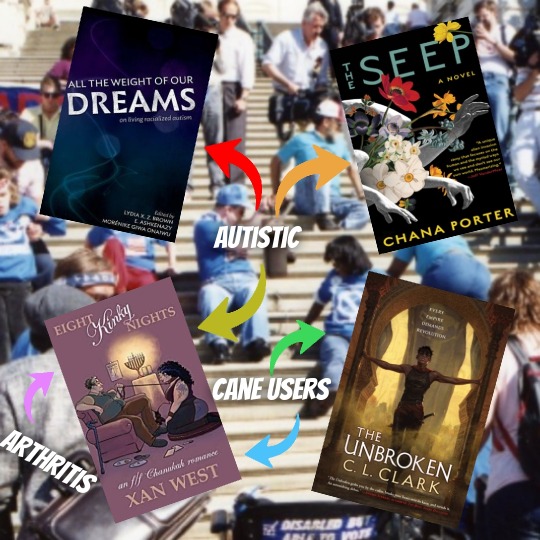
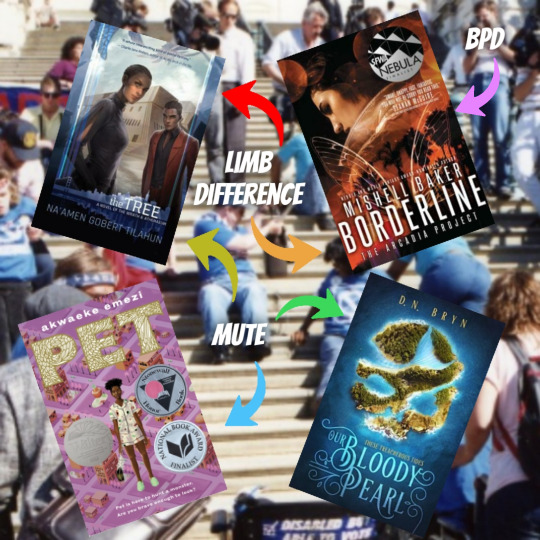

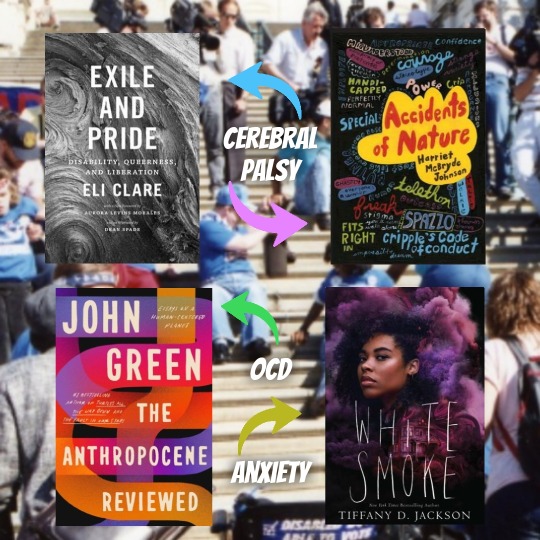
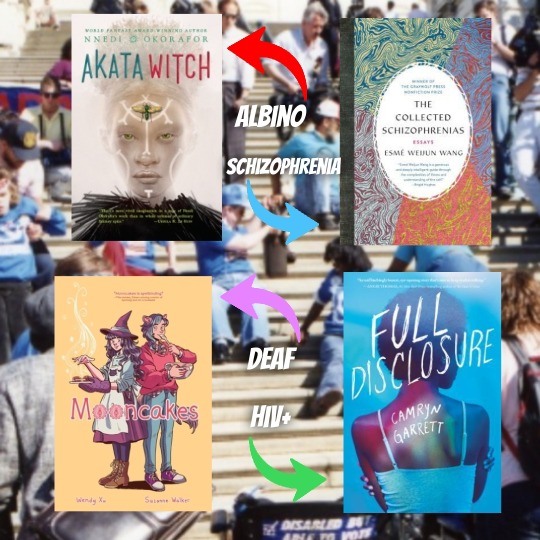
Another Instagram crosspost! This time for Disability Pride Month!
Note: The Tree is a sequel, but the MC sustains the injuries that make her disabled in book one
[Image: several graphics edited with a picture of The Capitol Crawl as the background. The first image has text reading "Favorite Disability Books."
The next image shows four books- All the Weight of Our Dreams: On Living with Racialized Autism ed by Lydia XZ Brown, E Ashkenazy, and Morénike Giwa, The Seep by Chana Porter, Eight Kinky Nights by Xan West, and The Unbroken by CL Clark. There is also text with colorful arrows pointing to the books. The label "autistic" points to All the Weight of Our Dreams, The Seep, and Eight Kinky Nights. The label "cane users" points to Eight Kinky Nights and The Unbroken, and the label "arthritis" points to Eight Kinky Nights.
The next image has four books- The Tree by Na'amen Gobert Tilahun, Borderline by Mishell Baker, Pet by Akwaeke Emezi, and Our Bloody Pearl by DN Bryn. This image also contains labels and arrows. "Limb difference" points to The Tree and Borderline. "Mute" points to The Tree, Pet, and Our Bloody Pearl. "BPD" points to Borderline.
The next image has two books. Disability Visibility: First Person Stories from the Twenty-First Century ed by Alice Wong is labeled "collected works." Care Work: Dreaming Disability Justice by Leah Lakshmi Piepzna-Samarasinha is labeled "no focus on a specific disability; about mutual aid."
The next image has four books- Exile and Pride: Disability, Queerness, and Liberation by Eli Clare, Accidents of Nature by Harriet McBryde Johnson, The Anthropocene Reviewed by John Green, and White Smoke by Tiffany D Jackson- and more colorful arrows. "Cerebral palsy" points to both Exile and Pride and Accidents of Nature. "OCD" points to The Anthropocene Reviewed, and "anxiety" points to White Smoke.
The last image features four books, each with one label pointing to it. Akata Witch by Nnedi Okorafor is labeled "albino." The Collected Schizophrenias by Esmé Weijun Wang is labeled "schizophrenia." Mooncakes by Wendy Xu and Suzanne Walker is labeled "Deaf." Full Disclosure by Camryn Garrett is labeled "HIV+" End.]
#bookblr#all the weight of our dreams: on living with racialized autism#the seep#eight kinky nights#wrath & athenaeum trilogy#arcadia project trilogy#the unbroken cl clark#pet akwaeke emezi#our bloody pearl#disability visibility#care work#exile and pride#accidents of nature#the anthropocene reviewed#white smoke#akata witch#the collected schizophrenias#mooncakes#full disclosure
107 notes
·
View notes
Text
Mothering and other forms of intimate labour reproduce and sustain both capital and life; both workers and comrades; both patriarchal society and the possibility of liberation from it.
In this sense, to say that life-preserving work (such as feeding, hoovering or wound-dressing) is ‘essential’ – as we did during the Covid pandemic and as Angela Garbes does in her new book about mothering – isn’t sufficient.
The better question would be: essential for what?
Sophie Lewis reviews Angela Garbes' Essential Labour: Mothering as Social Change
14 notes
·
View notes
Text
Building capacity! It’s tough, but doable - here are some tips:
Set aside time if possible to engage in organizing
I try to set aside an hour or two every day to handle things, and if it’s not possible that day I let folks know that I’m full up on capacity
Be realistic about capacity
Meeting your living and survival needs is the first step, if you’re not in that place or if shit is real, it’s always better to secure your safety and survival first. I have to work to survive, and have time to cook and care for my family, and make sure I’m meeting social and community obligations, and that time/energy gets priority over any organizing work. If folks don’t respect it, they need to be checked and I let folks know when I’m working through my life stuff.
Stay sustainable
As organizers, we’ve all felt some kind of burnout/overwhelmed feelings around doing and engaging in the work. One way to mitigate this is to push out timelines on when things should/can be done, and another way is to remember that we are part time revolutionaries and can only do so much.
As you’re engaging with the work, asking yourself “how long will this take and does this fit in with my own capacity/current obligations” is a powerful way to create perspective on the timelines of organizing work, another is “who else is engaged in the work and can it grow to meet this timeline”. Capitalism really rocks our brains and makes us think things need to be changed immediately, and a more sustainable way of thinking about it is envisioning the timeline/goals as something that will take time to build towards - focus on the intermediate steps.
Break down the work into manageable steps
Whatever your goal is, there are always smaller steps to be taken to accomplish it - if your goal is organize a rally for example, taking some time out of your capacity to jot down the smaller steps (outreach to folks, planning a meeting, creating a security cadre) can help us achieve the goals. The work doesn’t have to be done today, but we can take a moment to list out the smaller steps, and delegate or prioritize those that get us closer to the goal we wish to accomplish. For me, sometimes that looks like scheduling a 1:1 to talk about the work or doing a bit of the work now and saving more for later, or doing smaller steps in the organizing process, like structure work to help collect folks to do the work.
Communication is key (and hard!)
Let your comrades and Kasama know where you’re at in your capacity - letting folks know allows the work to be spread out and taken up by other members - if you need something taken off your plate, informing people that someone else may have to do this work can help the organizing process. As well, recognizing that we’re all a part of bigger units can help put the work into perspective.
Ask for help
Ask for help and offer to help when you can - during my time at sunrise I deeply embedded this value to my soul - now when I am overwhelmed I ask for help, and when I have capacity and resources to help out, I set aside capacity to do so.
May the end of the day, revolutionary work is hard, but by taking care of each other and having a clear understanding of our own resources, we can build a better world for all of us.
Isang Bagsak!
#community organizing#join an org#join local orgs#organizing tips#organize your block#anarchism#education#local organizing#dsa#anarchist#community building#care work#capacity building#political education#Filipino theory#Jewish theory#Jewish Bund
2 notes
·
View notes
Quote
Raj Patel estimates that the value of women’s unpaid work constitutes more than half the world’s entire labor output. In 2020, the New York Times pegged the value of women’s unpaid labor around the world at an overwhelming $10.9 trillion. This naturalization of reproductive work as unpaid, gendered work lays the foundation for underpaid domestic work in the wage economy. Maria Mies writes, “Women are the optimal labour force because they are now being universally defined as ‘housewives,’ not as workers; this means their work, whether in commodity production or use value, is obscured.”
Harsha Walia, Border and Rule: Global Migration, Capitalism, and the Rise of Racist Nationalism
124 notes
·
View notes
Text
Daily Book - Care Work: Dreaming Disability Justice
Care Work: Dreaming of Disability Justice
Leah Lakshmi Piepzna-Samarasinha
Adult Health, 2018, 304 pg
essays on disability justice, “a movement that centers the lives and leadership of sick and disabled queer, trans, Black, and brown people” by a disabled queer femme non-binary author (she/her) of Burgher/Tamil Sri Lankan and Irish/Roma descent
In this collection of essays, Lambda Literary Award-winning writer and longtime activist and performance artist Leah Lakshmi Piepzna-Samarasinha explores the politics and realities of disability justice, a movement that centers the lives and leadership of sick and disabled queer, trans, Black, and brown people, with knowledge and gifts for all.

View On WordPress
#Care Work#Care Work: Dreaming of Disability Justice#Leah Lakshmi Piepzna-Samarasinha#2010s#300 pg#adult books#essays#health#lgbt nonfiction#lgbtqia#nonbinary protagonist#nonfiction#queer books#disabled rep#queer#queer rep#daily book
3 notes
·
View notes
Text
We all know men who are so good at so many things outside the house, so quick to learn and adaptable but find little success in completing menial domestic chores. I feel it happens mostly because men have the choice to do only that which gets them reward and appreciation, especially from people outside their family, whereas women are entrenched with the sense of responsibility of carrying out the most deplorable of tasks for little to no reward. Men prefer the 'outside work' as it garners more attention and praise, along with the good name of being so devoted or dedicated.
In a patriarchal arrangement, men performing simple domestic chores are lauded and given unnecessary attention and hype. Yet, they often display significant incapacity to perform them. This is exhibited in various forms. The classic is, "I don't know how to do it" and thus avoid the task completely. Next being "tell me how it's done," thus making it tougher for the person who is trying to delegate the task or reduce their burden by having to explain and giving instructions - the peculiarity here is that, the same men would show an inability to follow the instructions efficiently in an attempt to prove how they are not good at it.
Weaponised incompetence refers to a situation where a person pretends to be bad at doing something in order to escape from having to do it at all. Women end up taking a larger share of domestic and carework in families and relationships, thus draining them and significantly reducing their chance for growth.
Why is domestic incompetence among men so normalised?
Some say that it is the result of poor parenting, where your parents do not impart the necessary skills. But our parents teach us plenty. Doesn't mean we imbibe all of them. Even if that's the case, there's always scope for course correction.
As a social being, it is your responsibility to identify where you falter and engage in course correction that would improve life for you and those around you. Stop taking people, circumstances, age old patriarchal conventions for granted. The change starts with you!
There are tonnes of material available online to educate yourself. You can start on IG. Look up #weaponizedincompetence and @thatdarnchat for starters.
8 notes
·
View notes
